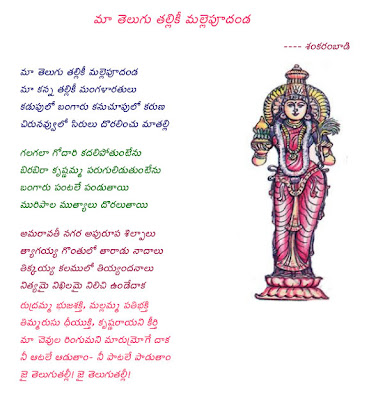Telugu epigraphy
The first inscription that is entirely in Telugu corresponds to the second phase of Telugu history. This inscription, dated 575 AD, was found in the Kadapa and Kurnool district region and is attributed to the Renati Cholas, who broke with the prevailing custom of using Sanskrit and began writing royal proclamations in the local language. During the next fifty years, Telugu inscriptions appeared in Anantapuram and other neighboring regions. The first available Telugu inscription in the coastal Andhra Pradesh comes from about 633 CE.
Around the same time, the Chalukya kings of Telangana also began using Telugu for inscriptions.[citation needed] Telugu was more influenced by Sanskrit than Prakrit during this period, which corresponded to the advent of Telugu literature. This literature was initially found in inscriptions and poetry in the courts of the rulers, and later in written works such as Nannayya's Mahabharatam (1022 AD).[7] During the time of Nannayya, the literary language diverged from the popular language. This was also a period of phonetic changes in the spoken language.
Middle Ages
Ketana (thirteenth century) in fact prohibited the use of spoken words in poetic works. During this period the separation of Telugu script from the common Telugu-Kannada script took place.Tikkana wrote his works in this script
Muslim rule
Telugu language has gone through a great deal of change (as did other Indian languages), progressing from medieval to modern. The language of the Telangana region started to split into a distinct dialect due to Muslim influence. South of the Krishna River (Rayalaseema region), however, the Vijayanagara empire gained dominance from 1336 till the late 1600s, reaching its peak during the rule of Krishnadevaraya in the sixteenth century, when Telugu literature experienced what is considered to be its golden age. Padakavithapithamaha, Annamayya, contributed many atcha (pristine) Telugu Padaalu to this great language. In the latter half of the seventeenth century, Muslim rule extended further south, culminating in the establishment of the princely state of Hyderabad by the Asaf Jah dynasty in 1724. This heralded an era of Persian/Arabic influence on the Telugu language, especially among the people of Hyderabad. The effect is also felt in the prose of the early 19th century, as in the Kaifiyats.
Recent history
In the current decade the Telugu language, like other Indian languages, has undergone globalization due to the increasing settlement of Telugu-speaking people abroad. Modern Telugu movies, although still retaining their dramatic quality, are linguistically separate from post-Independence films.
At present, a committee of scholars has approved a classical language tag for Telugu based on its antiquity. The Indian government has also officially designated it as a classical language.
Telugu is mainly spoken in the state of Andhra Pradesh and Yanam district of Pondicherry as well as in the neighboring states of Tamil Nadu, Puducherry, Karnataka, Maharashtra, Orissa,Chhattisgarh, some parts of Jharkhand and the Kharagpur region of West Bengal in India by people who are from Andhra Pradesh settled in these states. It is also spoken in Australia, New Zealand, Bahrain, Canada, Fiji, Malaysia, Singapore, Mauritius, Ireland, South Africa, the United Arab Emirates, the United States and the United Kingdom where there is a considerable Telugu diaspora. Telugu is the third most spoken language in the Indian subcontinent after Hindi and Bengali. British authors in the 19th century called Telugu the Italian of the East as all native words in Telugu end with a vowel sound, but it is believed that Italian explorer Niccolò Da Conti coined the phrase in the fifteenth century. Conti visited Vijayanagara empire during the reign of Vira Vijaya Bukka Raya in 1520s.
Lyrics
Maa telugu thalliki mallepoodandaa, maa kannathalliki mangalarathulu, kadupulo bangaru kanuchoopulo karuna,chirunavvulo sirulu doralinchu mathalli.Galagalaa godaari kadilipothuntenu,birabiraakrishnamma paruguliduthuntenubangaru pantale panduthayee,muripaala muthyalu dorulutai.Amaravathinagara apuroopa shilpaluthyagayya gonthulo tharadu nadhaluthikkayya kalamulo thiyyamdanalunithyamai nikhilamai nilachi yundedaakaRudramma bhujashakthi mallamma pathibhakthithimmarasu dheeyukthi,krishnarayala keerthimaa chevulu ringumani maarumrogedaakanee aatale aadutham,neepaatale paaduthaamJai telugu thalli,Jai telugu thalli...... Sankaram badi
Meaning :
Jasmin garland for our telugu talli aarathi to our mother land
pearls in her laughter, has my mother
river godavari flows here
river krishnaruns through this blessed land
golden crops grow here and pearls flow in this land
the preacious sculptures of amaravathi,
and the songs tuned by 'tyagayya'
he sweetness of 'tikkanna's writing
as they stay forever immortalized
The courage of 'rudramma' - the loyality of 'mallamma'
the wit of 'timmarusu' - the fame of 'krishna devaraya'
until the sound resonates in every ear
we play your tunes - we sing your songjai telugu talli, jaitelugu talli....

At End of this story like normal Indian movie we have fightsssssss...
Insted of saying Jai Telugu talli .. People saying Jai Telangana,Jai Andhra, Jai Samkyandra and Jai Greater Rayala seema.....
Let's think once.....................




No comments:
Post a Comment